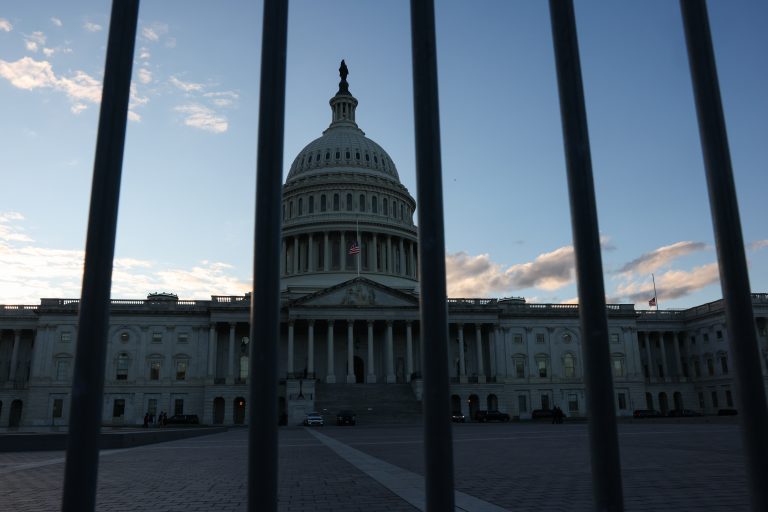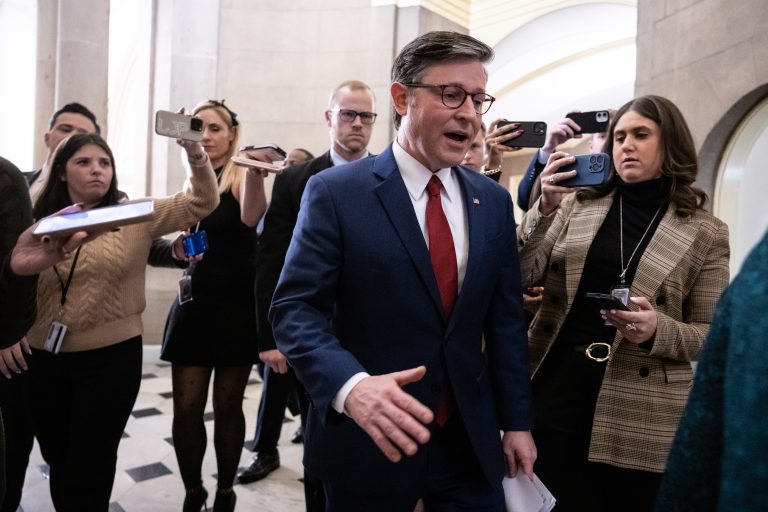The Senate passed a government funding package Monday night that paves the way for ending the longest shutdown in history.
The 60-40 vote came roughly 24 hours after a bipartisan group of rank-and-file senators, in tandem with Majority Leader John Thune, reached an agreement that officially broke a weeks-long partisan stalemate.
The bipartisan bill still needs to pass the House and get signed by President Donald Trump before the government can reopen. Speaker Mike Johnson has advised his members the House could vote on the package as soon as Wednesday.
But Senate passage puts the federal funding lapse on track to be over by the end of the week. Trump is expected to lean on any potential House GOP holdouts, and a cadre of moderate House Democrats could support the plan in a break with party leaders, who are still smarting over the failure to secure an extension of expiring Obamacare tax credits.
Eight members of the Senate Democratic Caucus voted to pass the deal, the same configuration of lawmakers who voted to advance the package the night before.
The package includes a three-bill “minibus” that would fund the Department of Agriculture and the FDA, the Department of Veterans Affairs and military construction projects, and the operations of Congress for all of the current fiscal year — the product of months of bipartisan, bicameral negotiations between top appropriators. All other agencies would be funded through Jan. 30.
The shutdown-ending agreement brokered in the Senate guarantees that federal employees laid off during the shutdown are rehired and gives federal employees back pay. It would require agencies to give written notice to Congress about the withdrawal of the layoff notices issued during the funding lapse, plus details on the amount of back pay owed.
It also would prevent some future firings with a blanket prohibition on reductions in force in any department or agency at least until the Jan. 30 end date of the continuing resolution. Democrats will also get a vote by mid-December on a bill to extend the enhanced ACA subsidies that are set to sunset at the end of the year.
Negotiators for the Senate Democratic Caucus — led by Sens. Jeanne Shaheen and Maggie Hassan of New Hampshire and Angus King of Maine — said the ability to vote on the subsidies constituted a major win. Negotiators made the case privately to their colleagues that the framework agreement was the best offer they were going to get from the GOP, who did not budge during the private talks on their refusal to get an ACA deal while the government was shuttered.
But Democrats in both chambers, including members of leadership, questioned why they would support an agreement when Republicans didn’t come to the table on their one key demand — negotiating on the Obamacare credits.
Some House progressives and outside groups were seething Monday and searching for someone to blame, with some calling on Senate Minority Leader Chuck Schumer to resign from his leadership position even though he, too, voted against the deal.
“Republicans have refused to move an inch, so I cannot support the Republican bill that’s on the floor because it fails to do anything of substance to fix America’s health care crisis,” Schumer said on the Senate floor Monday, adding that the 41-day shutdown has “exposed the depths of Donald Trump’s cruelty.”
Despite opposition to the funding package from most Democrats and Kentucky Republican Sen. Rand Paul, lawmakers ultimately declined to slow-walk the process, choosing instead to vote on the bill early Monday evening so they could leave town for a weeklong recess the next day.
Thune also appealed to his colleagues not to further delay the shutdown pain, which has led to thousands of flight delays and cancellations and an ongoing legal battle over the disbursement of critical federal food aid.
“I would encourage every member of this body, Democrat or Republican, pro-bill or anti-bill, not to stand in the way of being able to deliver the relief quickly. ….Let’s not pointlessly drag this bill out,” Thune said ahead of the vote.
In exchange for speedier passage of the spending package, Republican leaders gave Paul a vote on an amendment that would strike legislative language cracking down on intoxicating hemp products. His proposal to essentially preserve the status quo was defeated 76-24
Jennifer Scholtes and Katherine Tully-McManus contributed to this report.



